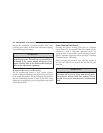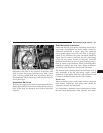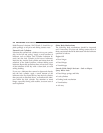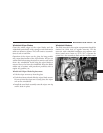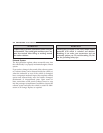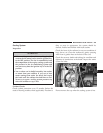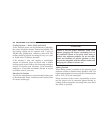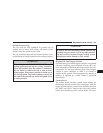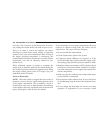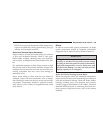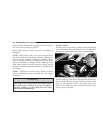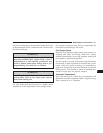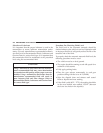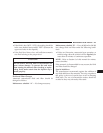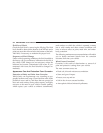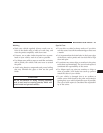
over time. This is normal. If the coolant level is hard to
see, jostling the coolant bottle will make it easier to see.
There is no need to remove the radiator cap unless
checking for coolant freeze point, adding, or replacing
coolant. Advise your service attendant of this. As long as
the engine operating temperature is satisfactory, the
coolant bottle need only be checked once a month. Heater
performance may also be adversely affected by low
coolant levels.
When additional coolant is needed to maintain the
proper level, it should be added to the coolant bottle. Do
not overfill. Special procedures are required when filling
the engine cooling system of the 2.7L Engine. See your
authorized dealer for details.
Points to Remember
NOTE:
When the vehicle is stopped after a few miles of
operation, you may observe vapor coming from the front
of the engine compartment. This is normally a result of
moisture from rain, snow, or high humidity accumulating
on the radiator and being vaporized when the thermostat
opens, allowing hot water to enter the radiator.
If an examination of your engine compartment shows no
evidence of radiator or hose leaks, the vehicle may be
safely driven. The vapor will soon dissipate.
•
Do not overfill the coolant bottle.
•
Check coolant freeze point in the system.
•
If frequent coolant additions are required, or if the
level in the bottle does not drop when the engine cools,
the cooling system should be pressure tested for leaks.
•
Maintain coolant concentration of 50% ethylene glycol
(minimum) with recommended antifreeze for proper
corrosion protection of your engine that contains alu-
minum components.
•
Make sure that the radiator and coolant bottle hoses
are not kinked or obstructed.
•
Keep the front of the radiator clean. If your vehicle has
air conditioning, keep the front of the condenser clean,
also.
•
Do not change the thermostat for summer or winter
operation. If replacement is ever necessary, install
208 MAINTAINING YOUR VEHICLE



